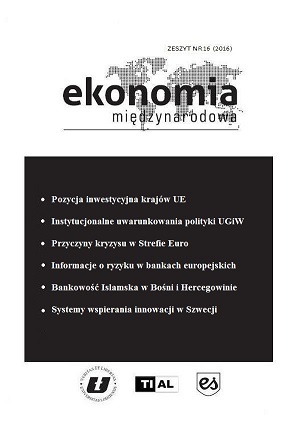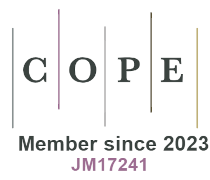Ocena bankowości islamskiej w Bośni i Hercegowinie – analiza porównawcza z użyciem podejścia CAMELS
DOI:
https://doi.org/10.18778/2082-4440.16.05Słowa kluczowe:
bankowość islamska, Bośnia i HercegowinaAbstrakt
W artykule przeprowadzono analizę bankowości islamskiej w Bośni i Hercegowinie. Wprawdzie aż prawie połowa ludności bośniackiej jest pochodzenia islamskiego, to tylko jeden bank funkcjonujący w tym kraju oparł swoją działalność wyłącznie na Szariacie. Celem artykułu jest przeprowadzenie analizy porównawczej sytuacji finansowej tego banku i sektora bankowego zarówno w Bośni, jak i w regionie Bałkanów Zachodnich. Wybrano metodę analizy opartą o system CAMELS, który bada instytucję, biorąc pod uwagę jej najistotniejsze elementy: jakość kapitału, jakość aktywów, zarządzanie w odniesieniu do pracowników, zyskowność, płynność oraz wrażliwość na ryzyko.
Bibliografia
ADIB (2015), ADIB, [Online] Available at: http://www.adib.ae [accessed on: 11/11/2015].
Google Scholar
Agić Z. (2012), Comparison of bank success in Bosnia And Herzegovina and countries in the region in 2012. Available at: http://dx.doi.org/10.7251/akt1321142s.
Google Scholar
Alfaro L., Chanda A., Kalemli-Ozcan S., Sayek S. (2003), FDI Spillovers, Financial Markets and Economic Development, IMF Working Paper, Working Paper No. 03/186: pp. 1–33. Available at: http://dx.doi.org/10.5089/9781451859485.001.
Google Scholar
DOI: https://doi.org/10.5089/9781451859485.001
Arestis, P. Panicos, D. (1997), Financial development and economic growth: Assessing the evidence. The Economic Journal 107 (442), pp. 783–799.
Google Scholar
DOI: https://doi.org/10.1111/j.1468-0297.1997.tb00043.x
Ariss R.T. (2010), Competitive conditions in Islamic and conventional banking: A global perspective, “Review of Financial Economics”, Vol. 19, pp. 101–108. Available at: http://dx.doi.org/10.1016/j.rfe.2010.03.002.
Google Scholar
DOI: https://doi.org/10.1016/j.rfe.2010.03.002
Ashfaq A., Kashif-ur-Rehman, Iqbal Saif M. (2010), Islamic Banking Experience of Pakistan: Comparison between Islamic and Conventional Banks, “International Journal of Business and management”, Vol. 5, No. 2. Available at: http://dx.doi.org/10.5539/ijbm.v5n2p137.
Google Scholar
DOI: https://doi.org/10.5539/ijbm.v5n2p137
Awan A.G. (2009), Comparison of Islamic And Conventional Banking In Pakistan, Proceedings 2nd CBRC, Lahore, Pakistan.
Google Scholar
Babic-Hodovic V., Tesche J. (2006), FDI and the Banking Sector in B&H and the Region, International Management Development Association Proceedings, pp. 1–7.
Google Scholar
Babić-Hodović, V., Mehić, E., Agić, E. (2009), Influence of Quantitative and Qualitative Factors of Banking Sector Development on Economic Growth in South East European Countries, Interdisciplinary Management Research, Vol. 5, pp. 683–693.
Google Scholar
Barker D., Holdsworth D. (1993), The Causes of Bank Failures in the 1980s. Research Paper No. 9325.
Google Scholar
Barr R.S., Killgo K.A., Siems T.S., Zimmel S. (2002), Evaluating the productive efficiency and performance of US commercial banks, Managerial Finance, Vol. 28 Issue: 8, pp. 3–25
Google Scholar
Bauer P.W., Berger A.N. (1998), Ferrier G.D., Humphrey D.B. Consistency conditions for regulatory analysis of financial institutions: A comparison of frontier efficiency methods, “Journal of Economics and Business”, Vol. 50.
Google Scholar
BBI (2015a), Bosnia Bank International.About Us, Available at: http://www.bbi.ba/en/static/about-us [accessed on: 11/11/2015].
Google Scholar
BBI (2015b), Bosnia Bank International. Bank Founders, Available at: http://www.bbi.ba/en/static/bank-founders [accessed on: 11/11/2015].
Google Scholar
Beck T., Demirgüç-Kunt A., Merrouche O. (2013), Islamic vs. Conventional Banking: Business Model, Efficiency and Stability, “Journal of Banking & Finance”, Vol. 37 Issue 2, pp. 433–447. Available at: http://dx.doi.org/10.1016/j.jbankfin.2012.09.016.
Google Scholar
DOI: https://doi.org/10.1016/j.jbankfin.2012.09.016
Beng S.C., Ming-Hua L. (2006), Islamic banking: Interest-free or interest-based?, Pacific-Basin Finance Journal 17, pp. 125–144. Available at: http://dx.doi.org/10.2139/ssrn.868567.
Google Scholar
DOI: https://doi.org/10.2139/ssrn.868567
Bley, J.; Kuehn, K. (2004), Conventional Versus Islamic Finance: Student Knowledge and Perception in the United Arab Emirates, “International Journal of Islamic Financial Services” 5 (4), pp. 17–30.
Google Scholar
Bourkhis K., Sami Nabi M. (2013), Islamic and conventional banks’ soundness during the 2007–2008 financial crisis, “Review of Financial Economics”, Vol. 22, Issue 2, pp. 68–77. Available at: http://dx.doi.org/10.1016/j.rfe.2013.01.001.
Google Scholar
DOI: https://doi.org/10.1016/j.rfe.2013.01.001
Cargill, T.F. (1989), CAMEL Ratings and the CD Market,Journal of Financial Services Research 3 (4), pp. 347–358.
Google Scholar
Casu B., Girardone C., Molyneux P. (2006), Introduction to Banking, Prentice Hall, FT, England: Pearsons Education.
Google Scholar
CBBH Annual Report (2010), Central Bank of Bosnia and Herzegovina, Annual Report.
Google Scholar
Cevik S., Charap J. (2011), The Behavior of Conventional and Islamic Bank Deposit Returns in Malaysia and Turkey, IMF Working Paper WP/11/156. Available at: http://dx.doi.org/10.5089/9781455293704.001.
Google Scholar
DOI: https://doi.org/10.5089/9781455293704.001
Chapra U.M. (1992), Islam and the Economic Challenge, Leicester, UK: The Islamic Foundation.
Google Scholar
Chong B.S., Liu M.H. (2009), Islamic banking: Interest-free or interest-based?, Pacific-Basin Finance Journal, No. 17.
Google Scholar
Cole R.A., Gunther J. (1998), Predicting Bank Failures, A Comparison of On-And Off-Site Monitoring Systems, “Journal of Financial Services Research”, 13(2).
Google Scholar
DOI: https://doi.org/10.1023/A:1007954718966
Christopoulos A., Mylonakis J., Diktapanidis P. (2011), Could Lehman Brothers’ Collapse Be Anticipated? An Examination Using CAMELS Rating System, “International Business Research”, Vol. 4, No. 2, pp. 11–19.
Google Scholar
Dubai Islamic Bank, 2015. Dubai Islamic Bank, [online] available at: http://dib.ae/ [accessed on: 11/11/2015].
Google Scholar
Efendić V. (2011), Efficiency of the Banking Sector Of Bosnia – Herzegovina with Special Reference to Relative Efficiency of the Existing Islamic Bank, 8th International Conference on Islamic Economics and Finance, Doha – Qatar, 18th–20th December 2011.
Google Scholar
Ergun U., Djedovic I. (2011), Islamic Banking with a Closer Look at Bosnia and Herzegovina: Knowledge, Perceptions and Decisive Factors for Choosing Islamic Banking, 8th International Conference on Islamic Economics and Finance, Doha – Qatar, 18th–20th December 2011.
Google Scholar
Göksu A., Becic A. (2012), Awareness of Islamic Banking in Bosnia and Herzegovina, International Research Journal of Finance and Economics, Issue 100, pp. 26–39.
Google Scholar
Hamid M.A., Azmi S.M. (2011), The Performance Of Banking During 2000–2009: Bank Islam Malaysia Berhad And Conventional Banking In Malaysia, “International Journal of Economics and Management Sciences”, Vol. 1, No. 1, pp. 09–19.
Google Scholar
Hasan M., Dridi J. (2010), The Effects of the Global Crisis on Islamic and Conventional Banks: A Comparative Study, IMF WP/10/2010. Available at: http://dx.doi.org/10.5089/9781455205318.001
Google Scholar
DOI: https://doi.org/10.5089/9781455205318.001
IFN Islamic Finance News (2014), IFN Country Analysis – Bosnia, [online] available at: www.islamicfinancenews.com/ifn-country-analysis-bosnia?page=1 [accessed on: 8/10/2014].
Google Scholar
Ika S.R., Norhayati A. (2011), A Comparative Study Of Financial Performance Of Islamic Banks And Conventional Banks In Indonesia, “International Journal of Business and Social Science”, Vol. 2, No. 15, pp. 199–2017.
Google Scholar
International Monetary Fund (2015), IMD eLibrary Data, [online] available at: http://elibrary-data.imf.org/ [accessed on: 11/11/2015].
Google Scholar
Islamic Development Bank (2015), Islamic Development Bank, [online] available at: http://www.isdb.org [accessed on: 11/11/2015].
Google Scholar
Iquibal Z. (1997) Islamic Financial Systems, Finance & Development, pp. 42–45, https://www.imf.org/external/pubs/ft/fandd/1997/06/pdf/iqbal.pdf.
Google Scholar
Iqbal M. (2001), Islamic And Conventional Banking In The Nineties: A Comparative Study, “Islamic Economic Studies”, Vol. 8, No. 2.
Google Scholar
Jaffar M., Manarvi I. (2011), Performance comparison of Islamic and Conventional banks in Pakistan, “Global Journal of Management And Business Research”, Vol. 11, Issue 1.
Google Scholar
Johnes J., Izzeldin M., Pappas V. (2014), A comparison of performance of Islamic and conventional banks 2004–2009, “Journal of Economic Behavior & Organization” 103, pp. S93–S107. Available at:http://dx.doi.org/10.2139/ssrn.2071615.
Google Scholar
DOI: https://doi.org/10.2139/ssrn.2071615
Kabir A., Dey S. (2012) Performance Analysis through CAMEL Rating: A Comparative Study of Selected Private Commercial Banks in Bangladesh, “Journal of Politics & Governance”, Vol. 1, No. 2/3.
Google Scholar
Kearney A.T., Korea LLC (2012), The Future of Islamic Banking, Seoul: A.T. Kearney, Inc.
Google Scholar
Khan M., Mirakhor A., (1989), The Financial System and Monetary Policy in an Islamic Economy, Journal of King Abdulaziz University: Islamic Economics, Vol. 1, pp. 39–57. Available at: http://dx.doi.org/10.4197/islec.1-1.2.
Google Scholar
DOI: https://doi.org/10.4197/islec.1-1.2
Klepić D. (2009), Islamic Banking – Bosnia and Herzegovina, Trade and Investment Officer, British Embassy Sarajevo.
Google Scholar
Komorowski R., Kubiszewska K., (2014), The UK’s banking system as financial hub for Islamic banking, International Journal of Behavioural Accounting and Finance 4(3), pp. 245–258.
Google Scholar
Lederer G., Contemporary Islam In East Europe, NATO Research Fellowships Programme, 1997–1999 (1999), Camberley: Conflict Studies Research Centre available at: http://www.nato.int/acad/fellow/97-99/lederer.pdf.
Google Scholar
Manshor Amat Taap Siong Choy Chong Mukesh Kumar Tat Kee Fong (2011), Measuring service quality of conventional and Islamic banks: a comparative analysis, “International Journal of Quality & Reliability Management”, Vol. 28, Issue 8, pp. 822–840. Available at: http://dx.doi.org/10.1108/02656711111162505 .
Google Scholar
DOI: https://doi.org/10.1108/02656711111162505
Mills P.S., Presley J.R. (1999), Islamic finance: Theory and practice, Macmillan, London.
Google Scholar
DOI: https://doi.org/10.1057/9780230288478
Mohamad S., Taufiq H., Bader M.K.I. (2014), Efficiency of Conventional versus Islamic Banks: International Evidence using the Stochastic Frontier Approach (SFA), Journal of Islamic Economics, Banking and Finance, pp. 107–130.
Google Scholar
Moin M.S. (2008), Performance of Islamic Banking and Conventional Banking in Pakistan: A Comparative Study, University of Skovde, http://his.diva-portal.org/smash/get/diva2:113713/FULLTEXT01.
Google Scholar
Nuhanović A. (2014), Specific Risk Management Islamic Banking With Special Reference To Bosnia And Herzegovina, “Journal of Applied Economics and Business”, Vol. 2, Issue 2, pp. 39–50.
Google Scholar
Observatory of Economic Complexity (2015), Observatory of Economic Complexity, [online] available at: http://atlas.media.mit.edu/en/ [accessed on: 8/11/2015].
Google Scholar
Olson D., Taisier A. Zoubi (2008), Using accounting ratios to distinguish between Islamic and conventional banks in the GCC region, The International Journal of Accounting, Vol. 43 Issue 1, pp. 45–65. Available at: http://dx.doi.org/10.1016/j.intacc.2008.01.003.
Google Scholar
DOI: https://doi.org/10.1016/j.intacc.2008.01.003
Safiullah Md. (2010), Superiority of Conventional Banks & Islamic Banks of Bangladesh: A Comparative Study, “International Journal of Economics and Finance”, Vol. 2, No. 3. Available at: http://dx.doi.org/10.5539/ijef.v2n3p199.
Google Scholar
DOI: https://doi.org/10.5539/ijef.v2n3p199
Sarker A. (2005),CAMEL Rating System in the Context of Islamic Banking: A Proposed ‘S’ for Shariah Framework, “Journal of Islamic Economics and Finance”, Vol. 1, No.1, 2005.
Google Scholar
Shamsher M., Taufiq H., Bader M.K. (2007), Efficiency of Conventional versus Islamic Banks: International Evidence using the Stochastic Frontier Approach (SFA), “Journal of Islamic Economics, Banking and Finance”.
Google Scholar
Siti R.I., Norhayati A. (2011), A Comparative Study Of Financial Performance Of Islamic Banks And Conventional Banks In Indonesia, “International Journal of Business and Social Science”, Vol. 2, No. 15.
Google Scholar
Sudin H., Wan Nursofiza Wan A. (2008), Determinants of Islamic and conventional deposits in the Malaysian banking system, Managerial Finance, Vol. 34, Issue 9 pp. 618 – 643. Available at: http://dx.doi.org/10.1108/03074350810890976.
Google Scholar
DOI: https://doi.org/10.1108/03074350810890976
Thomson Reuters Zawya (2015), Thomson Reuters Zawya, [online] Available at: https://www.zawya.com/islamic-finance/ [accessed on: 8/11/2015].
Google Scholar
Torbat, A. E. (2005). Impacts of the US trade and financial sanctions on Iran, The World Economy 28 (3), pp. 407–434.
Google Scholar
Trading Economics (2015), Trading Economics, [online] Available at: http://www.tradingeconomics.com/ [accessed on: 8 11 2015].
Google Scholar
UK Trade & Investment (2014), UK Excellence in Islamic Finance, London: Business is Great Britain.
Google Scholar
Usman A., Khan M.K. (2012),Evaluating the Financial Performance of Islamic and Conventional Banks of Pakistan: A Comparative Analysis, International Journal of Business and Social Science, Vol. 3, No. 7.
Google Scholar
Warde, I. (2000), Islamic finance in the global economy, Edinburgh: University Press.
Google Scholar
DOI: https://doi.org/10.3366/edinburgh/9780748612161.001.0001
The World Bank (2015), The World Date Bank’s Databank, [online] Available at: http://data.worldbank.org/country/bosnia-and-herzegovina [accessed on: 8/11/2015].
Google Scholar
Zulkifli, H. (2010), Islamic banking and finance in Bosnia and Herzegovina, [online] Available at: https://zulkiflihasan.wordpress.com/2010/09/29/islamicbanking-and-finance-in-bosnia-and-herzegovina/ [accessed on: 8/11/2015].
Google Scholar
Pobrania
Opublikowane
Jak cytować
Numer
Dział
Licencja

Utwór dostępny jest na licencji Creative Commons Uznanie autorstwa – Użycie niekomercyjne – Bez utworów zależnych 4.0 Międzynarodowe.









